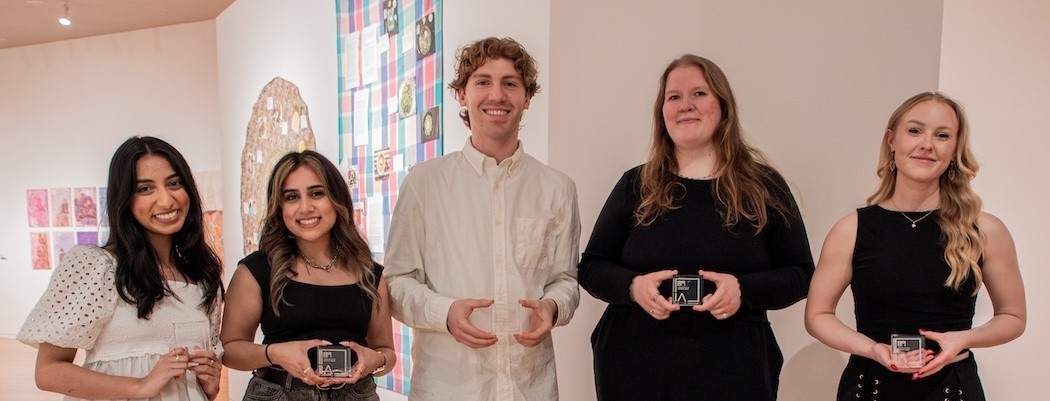
DAAPworks reveals 2025 Innovation Awards – discover the winning designs
Impactful, creative projects shine bright at DAAPworks
Innovation took center stage at DAAPworks 2025, an event showcasing the brilliant work of graduating seniors at the University of Cincinnati.
The prestigious event unveiled creative and forward-thinking capstone projects from students in UC's ’s College of Design, Architecture, Art, and Planning — ranked as one of the top design schools in the United States.
UC’s 1819 Innovation Hub partnered with DAAP to honor five of the event’s most creative, impactful and forward-thinking designs. This culminated in the second-annual 1819 Innovation Awards, presented in front of a large audience on April 29 during DAAPworks.
Introducing the winners
Students presented their senior capstone projects with each revealing the crossroads between problem-solving and creativity. 1819 Innovation Award judges picked the event’s top projects based on:
- Creativity
- Impact
- Feasibility
- Sustainability
- Adaptability
- Scalability
- Innovative
Based on these criteria, five standout capstones were selected as this year’s winners.
Lexi ASL learning program
Project designer: Miriam Kolis
Lexi is an at-home American Sign Language, or ASL, learning device tailored toward families with deaf or hard-of-hearing children. The product helps kids sign correctly from an early age by sensing where their hands are and returning specific feedback for improvement.
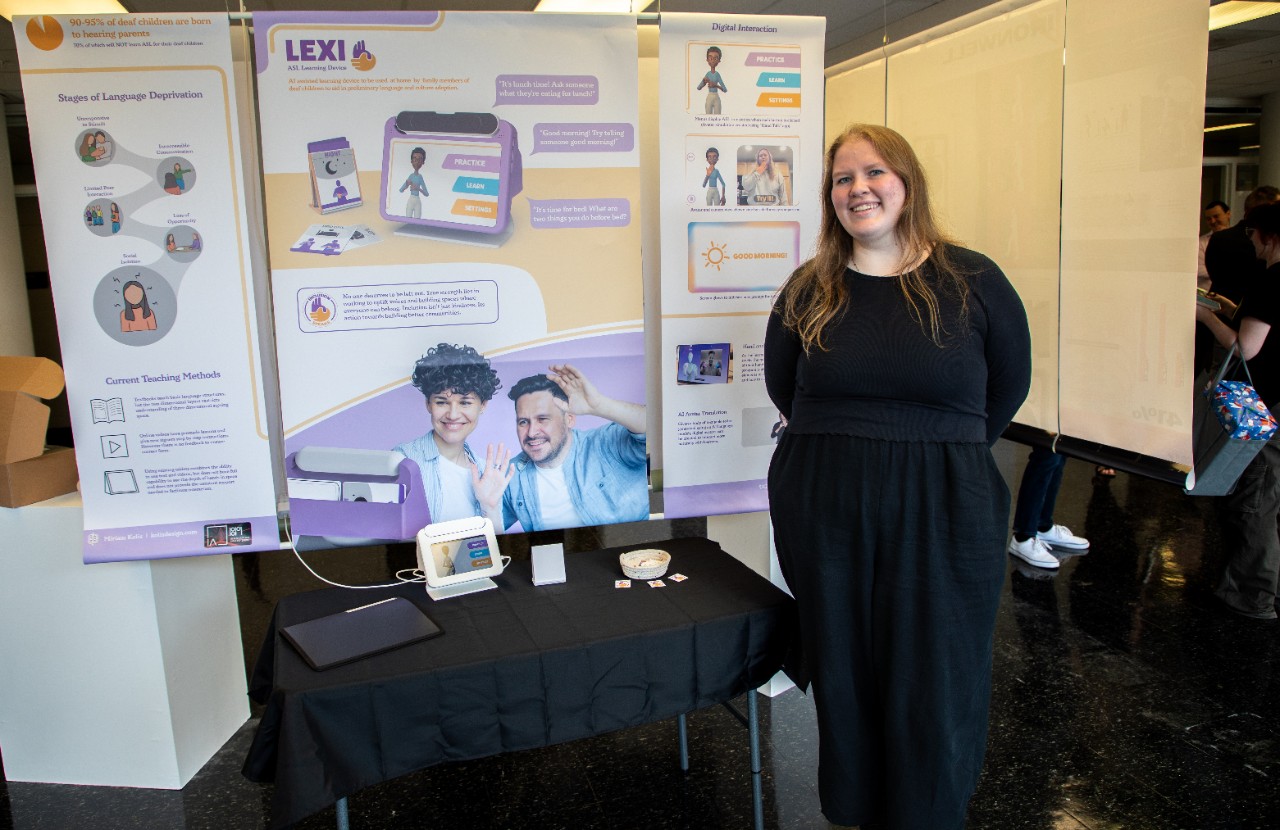
Kolis standing in front of her project. Photo/Mary Dwyer
Project designer Miriam Kolis says that Lexi’s primary goal is “to push learning ASL as the most accessible language for deaf children before they get to school age … making sure they can interact with everyone in their family.”
Kolis started learning ASL early and realized it’s a challenging language, perhaps even more so than English. However, she noticed that many ASL learning platforms are outdated and inadequate for today’s audiences. Thus, her capstone project was born.
Lexi isn’t just an innovative idea; it has life-changing potential, she said.
“This project keeps [children] from language deprivation,” Kolis says. “They would be able to speak to their family and interact socially with their peers while keeping up with milestones. It’s really setting them up for success.”
Nomad backcountry navigation system
Project designer: Wesley Reed
Nomad is a wearable device that helps backcountry skiers and snowboarders safely journey up and down mountains. It merges navigational assistance, real-time location services and reliable video recording into a simple design, allowing users to backcountry ski without worrying about what would happen if something went wrong.
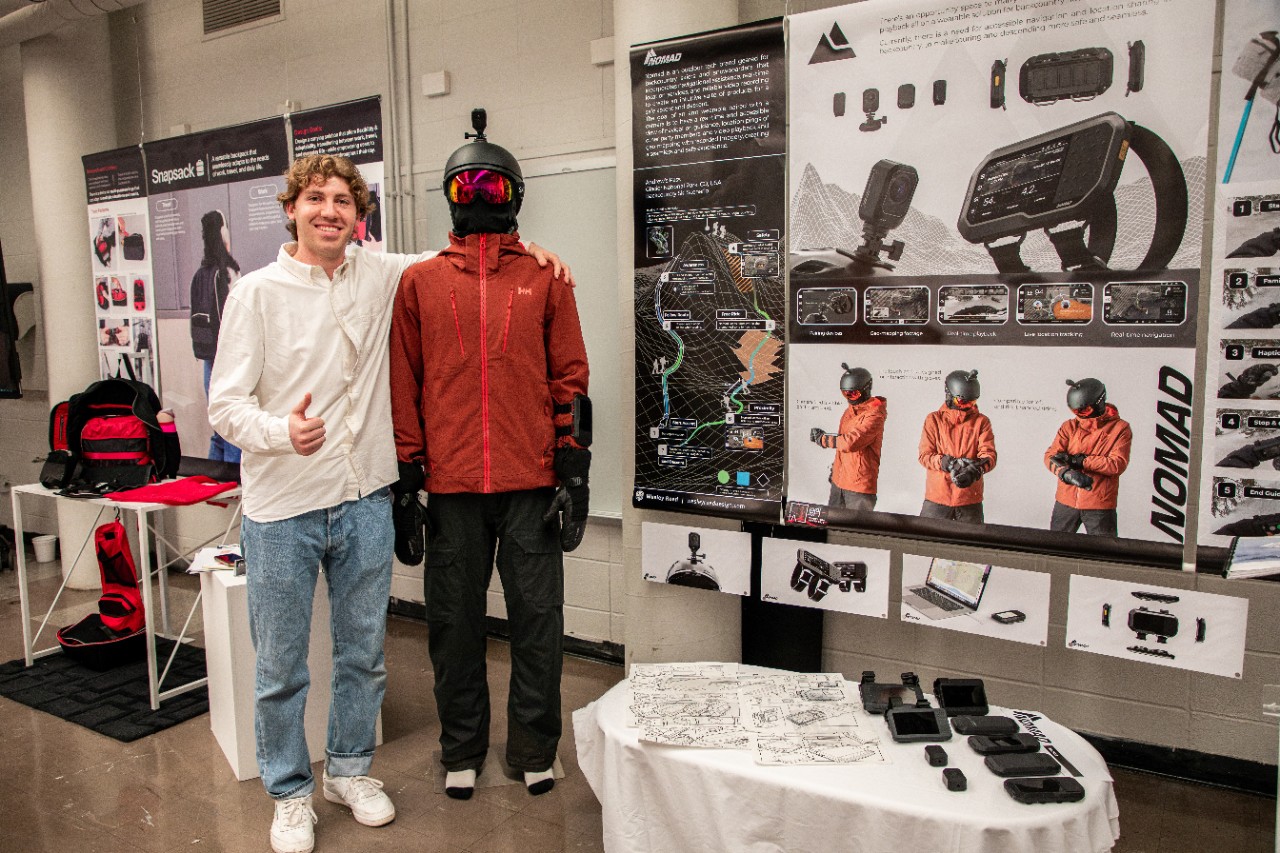
Reed with his capstone design. Photo/Mary Dwyer
Freeriding and snowboarding in remote terrain have always been risky. Navigating unmarked or unpatrolled areas outside the boundaries of groomed trails provides adventure but comes with extra dangers in a sport that’s already prone to injuries, falls and frostbite.
“Nomad could potentially save lives,” designer Wesley Reed says. “If there’s an emergency, you can rescue someone because you see their position and footage of where they are on the mountain. That is so important.”
Nomad’s design has plenty of innovation – according to Reed, the product “combines gear that skiers already take, in a more compact and accessible way.”
With this convenient and minimalistic product, skiers can feel safer as they head down untracked, snow-covered mountains.
“That brings a new sense of comfort and freedom,” Reed says. “You can truly be a nomad.”
Respira airway clearance tool
Project designer: Alina Hyder
Cystic fibrosis is a genetic disorder that causes thick and sticky mucus to collect in the airways, making it tough to breathe. With Respira, designer Alina Hyder crafted a product that puts magnetic nanoparticles into patients’ lungs and uses a magnetic base to push mucus out of their airways.
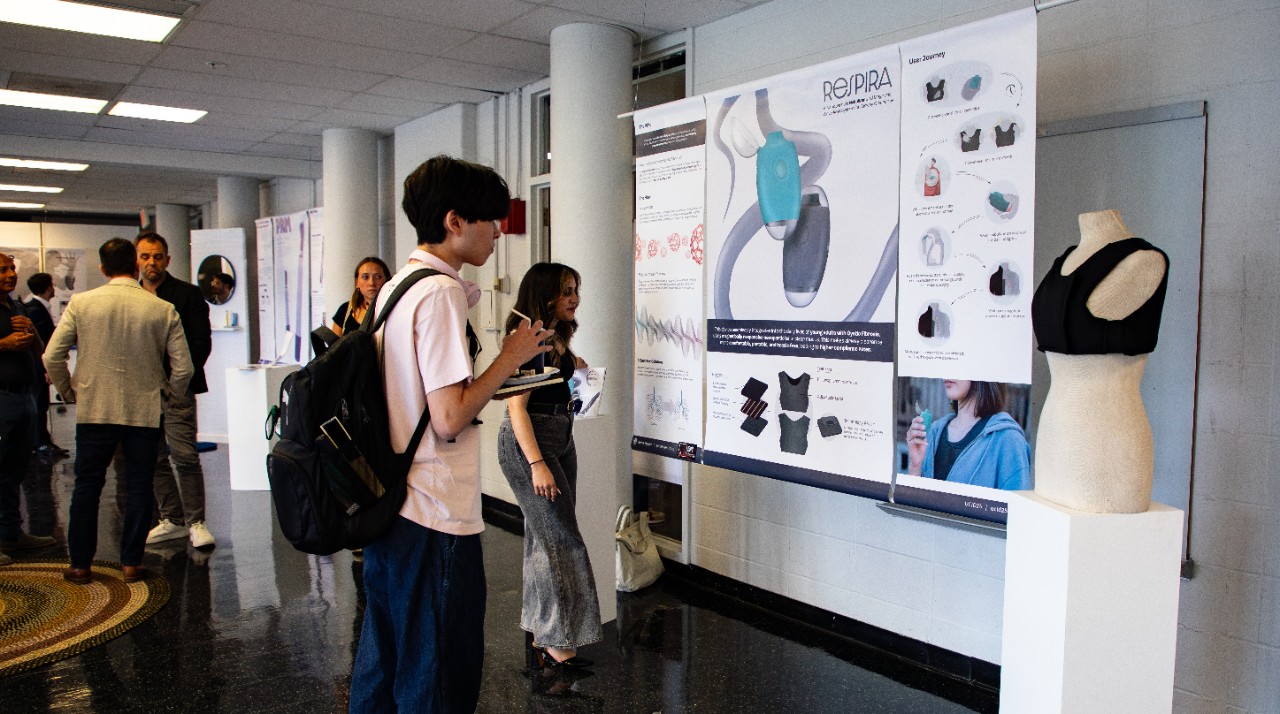
Respira project booth with Hyder in the background. Photo/Mary Dwyer
Noncompliance is a challenge with younger cystic fibrosis patients, but Hyder notes that Respira could boost compliance by lowering treatment’s physical impact. “This is a way where [patients] could continue to go outside and do their homework while not feeling like they’re tied to their treatment, which is plugged into a wall,” she notes.
While nanoparticles are still an emerging technology, Hyder was intrigued instead of being deterred. “Seeing the current state of cystic fibrosis treatments, I thought there was a lot of room for improvement,” she says. “It felt like a really good space for me to take the current technology, put in an emerging technology and create a much better, user-centric solution.”
Hyder believes that moving forward, Respira could help cystic fibrosis patients better follow their treatment plans, reduce the embarrassment many patients feel while doing so and ultimately boost their quality of life.
Hero Kits CPR training for children
Project designer: Shahar Ahmad
Hero Kits is a tool that teaches children how to perform hands-on CPR, a skill that’s lacking even among adults. According to designer Shahar Ahmad, her project “is aimed to empower kids to get their journey started of learning CPR in general emergency situations.”
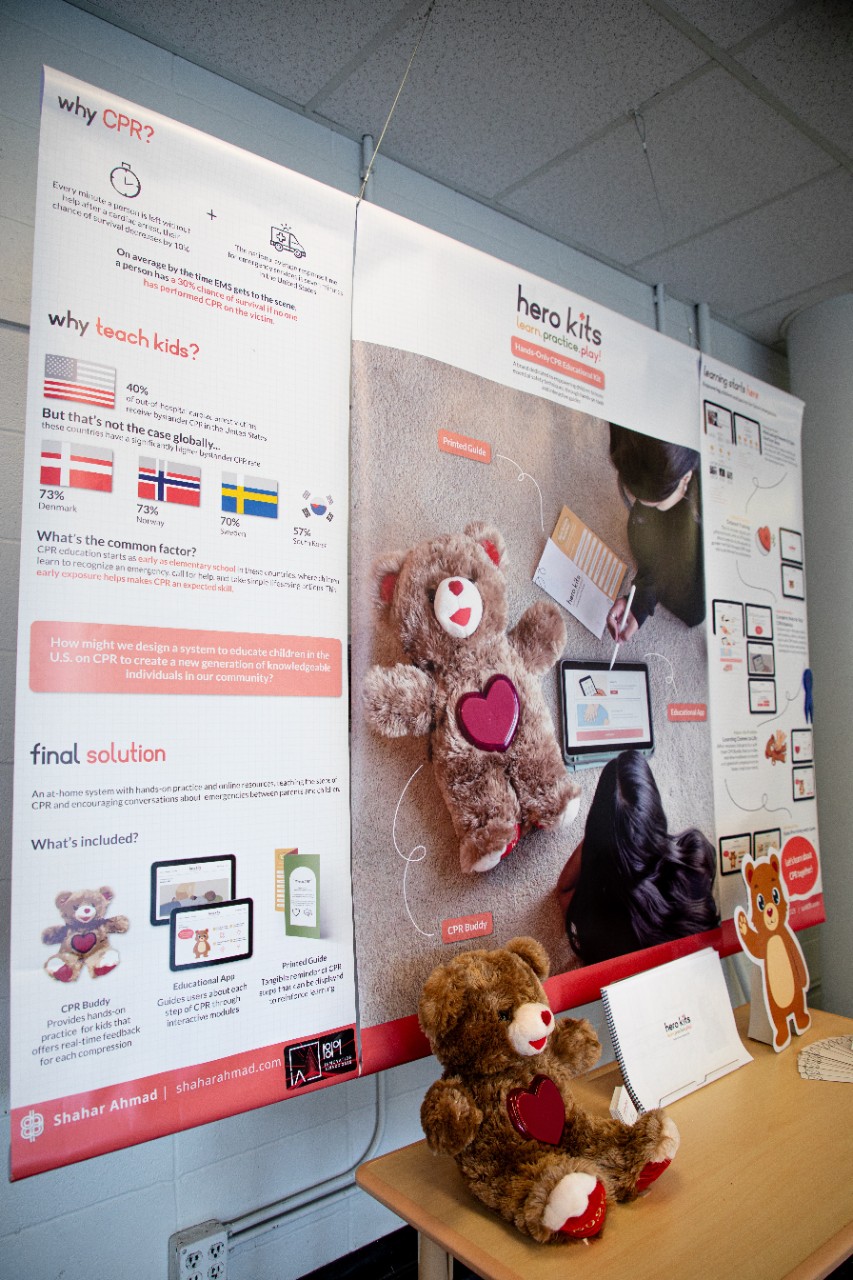
Close-up image of Hero Kits. Photo/Mary Dwyer
Findings from the American Heart Association’s 2023 report show that only 40% of those with an out-of-house cardiac arrest receive emergency care, such as CPR, before professional help arrives. As a result, more than 210,000 people nationwide didn’t receive potentially lifesaving chest compressions when help was immediately needed.
By training children from a younger age, Ahmad hopes Hero Kits will lead to stronger knowledge of CPR and lives rescued. “During my research phase, I talked to a lot of EMTs and hospital staff,” Ahmad says, “and they mentioned the need for community education … people rely on them in emergency situations and don’t realize a lot can be done at home.”
Just because critical actions can be performed at home doesn’t mean they are – underscoring the vital need for Hero Kits. Ahmad is optimistic that her project can make a difference: “I hope this helps the next generation become more knowledgeable and confident to be able to act, help more people and ultimately save lives.”
Nugget news formatting app
Project designer: Alexandra Fernholz
Nugget was designed to condense and summarize the deluge of daily news for a Gen Z audience. Today’s content is often overwhelming for readers – young and old alike – and Nugget hopes to make it more accessible and relatable while remaining accurate.
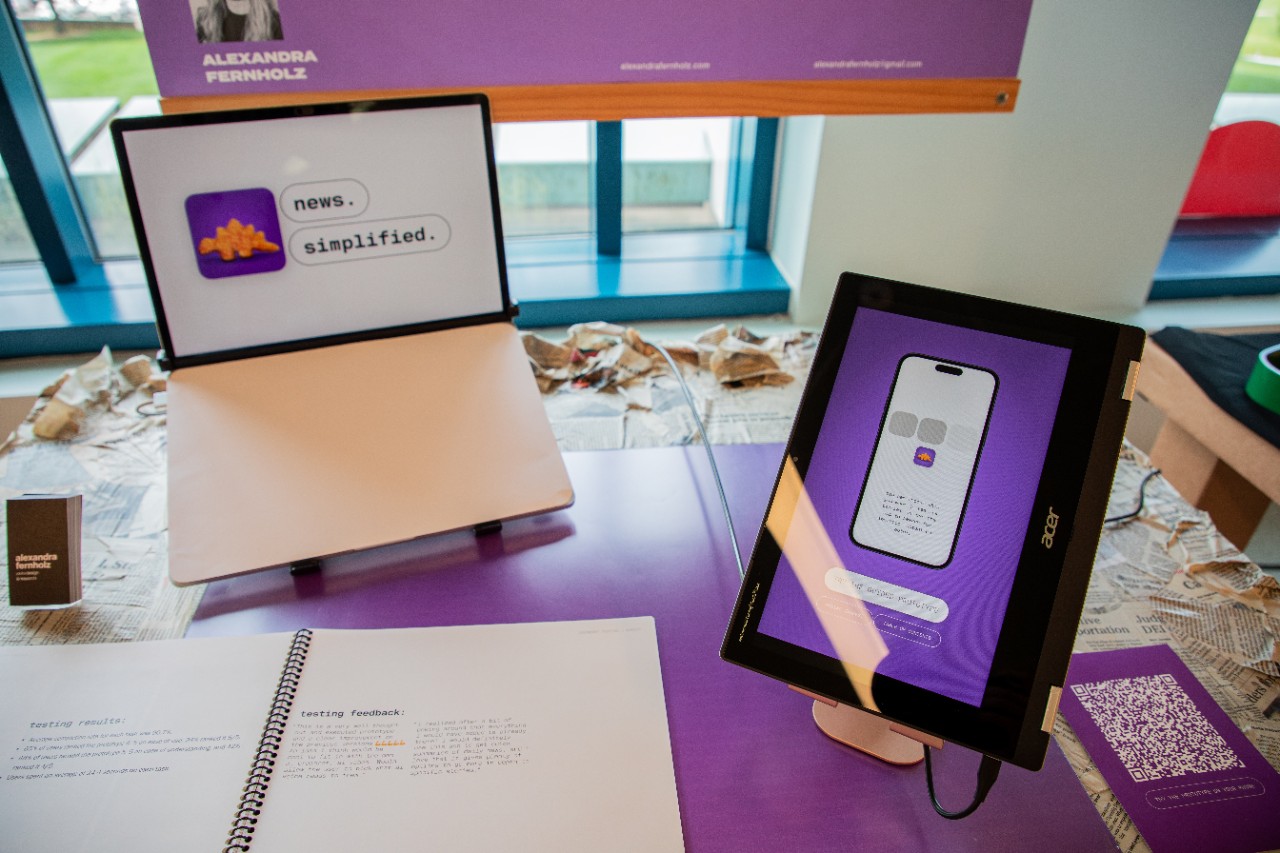
Nugget project booth. Photo/Mary Dwyer
The platform prioritizes short-form and visually based content, keeping information pithy for a busy generation. “The main point of the app,” according to designer Alexandra Fernholz, “is to provide a quick, five-second overview complete with video and audio.”
Fernholz was inspired to create Nugget as a student journalist, and at that time, she saw readers skimming through articles. By consolidating news stories into a simpler approach, she realized viewers could engage with more content while diversifying their sources.
“There are so many different places where people can get their news,” Fernholz notes. “[Nugget] is a great way to use AI in the way it was meant to be used: to make our lives simpler.”
Featured image at top: DAAPworks 2025 award winners, left to right: Shahar Ahmad, Alina Hyder, Wesley Reed, Miriam Kolis and Alexandra Fernholz. Photo/Mary Dwyer
Innovation Lives Here
The University of Cincinnati is leading public urban universities into a new era of innovation and impact. Our faculty, staff and students are saving lives, changing outcomes and bending the future in our city's direction. Next Lives Here.
Related Stories
Did plants nearly wipe out all marine life on Earth — twice?
March 2, 2026
An expert on global mass extinctions at the University of Cincinnati provided context to a new study examining the spread of the first land plants on Earth between 360 million and 540 million years ago.
Cincinnati a top destination for street art, museums
February 27, 2026
Discover why Cincinnati is a top destination for street art and museums, ranked among USA Today’s 10Best for 2026. Explore how University of Cincinnati research shows public art boosts community vitality, and find the best things to do near UC’s campus for students and visitors alike.
Intrapreneurship: Strategies to promote internal innovation
February 27, 2026
Intrapreneurship encourages employees at large companies to innovate and test ideas with an entrepreneur’s level of freedom. Learn how to become an intrapreneur in your organization.
